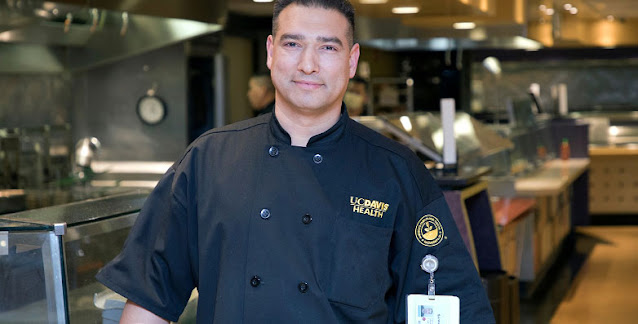Variety. Flavor. Colorful. Not words that usually come to mind when most of us think of hospital food.
But one hospital chef is changing all that, to the tune of over 2 million meals every year, for the patients, health care workers, and hospital visitors he’s charged with feeding.
Executive Chef Santana Diaz at UC Davis Health in Sacramento stepped into his role three years ago, and since then has transformed not just the menus but the way the hospital supports its local economy — serving up delicious, nutritious food procured from nearby farms.
“My goal is to educate patients about the benefits of eating healthy and to make sure the healthy choice is an easy one,” Santana said.
Purchasing food grown just 30 miles up the road allows the innovative chef to serve higher quality food and support the local farming and business community.
Santana’s prior experience was in fine dining restaurants, hotels, and the culinary programs for major sports stadiums. He could work in any restaurant, anywhere. Instead, he chooses to work in a hospital, because that’s where he believes he can make the biggest impact.
“I now consider this my life’s work,” he said.
As a passionate advocate for changing the hospital status quo, Santana approaches his work from the perspective of “health care without harm,” starting with the food that patients, health care workers, and families eat at the hospital.
“What we’re doing shows everyone that it’s possible to serve locally grown, higher quality, healthy foods to our patients, families, and staff. We’re educating people that making the healthy choice is easy,” he said.
For Santana and his team, that means securing local fruits and vegetables from the Sacramento area and other nearby farms and creating menus that make the best use of those fresh products, with little or no packaged foods.
“We all have a story about visiting a loved one in the hospital and having to bring them food to comfort them — a burger or some other favorite. My thinking is, let’s make food a priority intervention while they’re in our care,” Santana said.
Among the many innovations on the hospital’s menu are a minimum requirement of four colors on every plate and a no-salt spice line with flavors such as taco, grilling, and shawarma — all toward the goal of creating attractive, flavorful food to help patients understand that, even within a limited diet, they can enjoy their meals.
Before the pandemic, the UC Davis Food and Nutrition Services team developed, tailored, and served nearly 6,700 meals every day and is again approaching that volume. The team works within the parameters of 38 different therapeutic diets (low sodium, renal, cardiac, etc.) to improve the near-term and long-term health of thousands of patients with myriad needs.
“I look at it as 18 different opportunities,” Santana said. “The average stay is 6.1 days. That’s 18 meals during a stay and 18 opportunities to educate or change someone’s perspective. We’re not trying to fit inside of a box. We’re trying to re-do this program so there is no box.”
In addition to crafting delicious menus within nutritional guidelines, Santana’s commitment extends far into the community by boosting farms, farmers, and the local job market.
 |
| Executive Chef Santana Diaz of UC Davis Health in Sacramento tours Durst Organic Growers in Esparto to source fresh local produce for a hospital farm-to-fork program. (Photo courtesy UC Davis Health) |
As one of the largest production kitchens in the region, serving millions of meals every year, the hospital can project its needs far in advance and contract with farmers, which reduces their financial risk by assuring they have a buyer for their crops.
“We forecast out with local farmers how much asparagus we need in the spring or squash in the fall, so they can price out what they need to plant, how much labor they need for harvesting, etc.,” Santana said. “It creates jobs and stability in our local economy, and if we can reduce their risk we can bring down the pricing, too.”
Having brought farm-to-fork cooking into the hospital setting, the team at UC Davis Health has taken its role to the next level — introducing new flavors, improving nutrition, and promoting the health of the local economy.
“I believe that we have to look at the proactive approaches we can take to change the stigma of health care food,” Santana said. “If someone has to come to the hospital, we want to make it the best experience possible.”


No comments:
Post a Comment